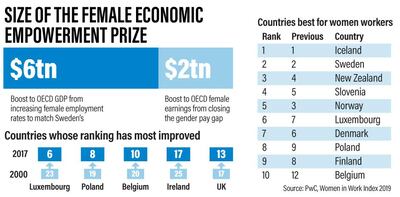Iceland and Sweden retained their positions as the best developed countries for female workers, with the US and UK lagging behind many Nordic countries and Canada, a study by professional services company PwC showed.
Iceland, Sweden and New Zealand, took the first three places in that order in PwC’s annual ranking of female labour force participation and welfare of women in the workplace, across 33 Organisation for Economic Co-operation and Development countries.
Nordic countries held five of the top 10 places, coming above the two largest English-speaking economies of the UK and US, which ranked 13th and 23rd, respectively. Canada came in 12th in the ranking.
The UK improved its position only slightly from the previous year’s index, moving up from 14th position. Its female labour force participation rate of 57 per cent lags significantly behind Sweden’s 69 per cent, the study showed.
Progress in the UK is held back by a “stubbornly persistent” gender pay gap, which will require concerted government policy and business action to address, PwC said in a report published on Tuesday with the index.
“Women in the OECD still face significant challenges and inequalities in the workplace,” PwC said.
“The pay gap persists and women are still under-represented in corporate leadership, with women accounting for only one in five board seats in the largest publicly-listed companies in the OECD.”
Improving female participation in the work across the OECD could boost its collective gross domestic product by $6 trillion, while closing the gender pay gap could boost OECD GDP by $2tn, according to PwC.
Since 2000, Luxembourg and Poland have made the largest improvements on the index while Portugal, the US and Austria have dropped the most in rankings over the period. There was a substantial rise in the pay gap in Portugal, while there was a decline in female participation in the labour force and full-time employment in the US and Austria, respectively. The US fell two positions in the latest ranking.
The report said that China and India are making a significant contribution to economically empowering millions of women, but said there was still room for improvement.
Had they both been included in the index, China would have been placed in between Slovakia in 26th place and Japan at 27th, while India would be placed last, after Korea, in 33rd place.
The 2019 index examines data from 2017, compared with the previous year.


